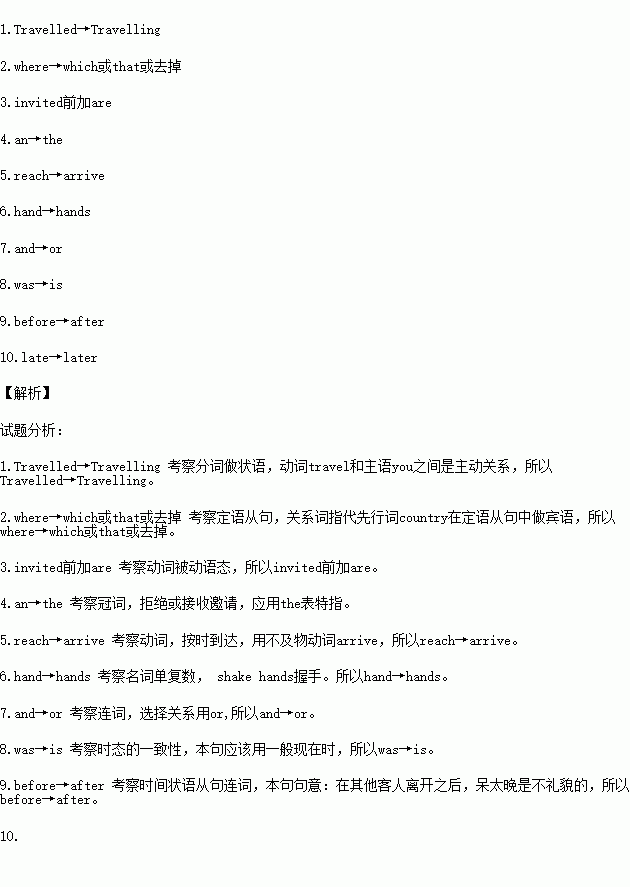ĢāÄæÄŚČŻ
¶ĢĪÄøÄ“ķ
¼ŁČēÓ¢ÓļæĪÉĻĄĻŹ¦ŅŖĒóĶ¬×ĄÖ®¼ä½»»»ŠŽøÄ×÷ĪÄ£¬ĒėÄ抎øÄÄćĶ¬×ĄŠ“µÄŅ»ĘŖ×÷ĪÄ”£ĪÄÖŠ¹²ÓŠ10“¦ÓļŃŌ“ķĪó£¬Ćæ¾äÖŠ×ī¶ąÓŠĮ½“¦”£“ķĪóÉę¼°Ņ»øöµ„“ŹµÄŌö¼Ó”¢É¾³ż»ņŠŽøÄ”£
Ōö¼Ó£ŗŌŚČ±“Ź“¦¼ÓŅ»øöĀ©×Ö·ūŗţؔģ©£¬²¢ŌŚĘäĻĀĆꊓ³öøĆ¼ÓµÄ“Ź”£
ɾ³ż£ŗ°Ń¶ąÓąµÄ“ŹÓĆŠ±Ļߣأܣ©»®µō”£
ŠŽøÄ£ŗŌŚ“ķµÄ“ŹĻĀ»®Ņ»ŗįĻߣ¬²¢ŌŚøĆ“ŹĻĀĆꊓ³öŠŽøÄŗóµÄ“Ź”£
×¢Ņā£ŗ1£®Ć擦“ķĪó¼°Ę䊎øľł½öĻŽŅ»“Ź£»
2£®Ö»ŌŹŠķŠŽøÄ10“¦£¬¶ąÕߣؓӵŚ11“¦Ęš£©²»¼Ē·Ö”£
Travelled abroad, you should follow the customs of the country where you are visiting. When you invited, it is good manners to refuse or accept an invitation, either by writing or by telephoning. If you go to the party, it is polite to reach on time. It is good manners to shake hand with your host. You can take a present if you like, possibly a bottle of wine, a box of chocolates and some flowers. However, it was not bad manners to take nothing. It is not polite to stay too late before the other guests have gone. Also, it is suggested to write or telephone a day or two late to thank your host.
 ŌĶĮæģ³µĻµĮŠ“š°ø
ŌĶĮæģ³µĻµĮŠ“š°øŹéĆę±ķ“ļ
¼ŁÉčÄćŹĒÄ³ÖŠŃ§Ń§Éś»įÖ÷ĻÆĄī»Ŗ”£ĒėÄćøł¾ŻŅŌĻĀŅŖµćøųÄćŠ£Ķā½ĢDaniel·¢Ņ»·āÓŹ¼ž£¬ŃūĒėĖū²Ī¼ÓÄćŠ£µÄŌĖ¶Æ»į”£
Ź±¼ä | 10ŌĀ14ČÕ”Ŗ”Ŗ16ČÕ |
µŲµć | ĻŲĢåÓż³” |
ѧɜĻīÄæ | ĢļČü£¬¾¶Čü (track and field events) |
½ĢŹ¦ĻīÄæ | 4”Į100Ć×½ÓĮ¦Čü |
×¢Ņā£ŗ1“ŹŹż100“Ź×óÓŅ
2 æÉŅŌŹŹµ±Ōö¼ÓĻø½Ś£¬ŅŌŹ¹ŠŠĪÄĮ¬¹į
3 ÓŹ¼žµÄæŖĶ·ŅŃøų³ö£¬µ«²»¼ĘČė×Ü“ŹŹż
Dear Daniel,
I am Li Hua, Chair of the StudentsӮ Union for our school.
_______________
_______________
_______________
Best wishes,
Li Hua


